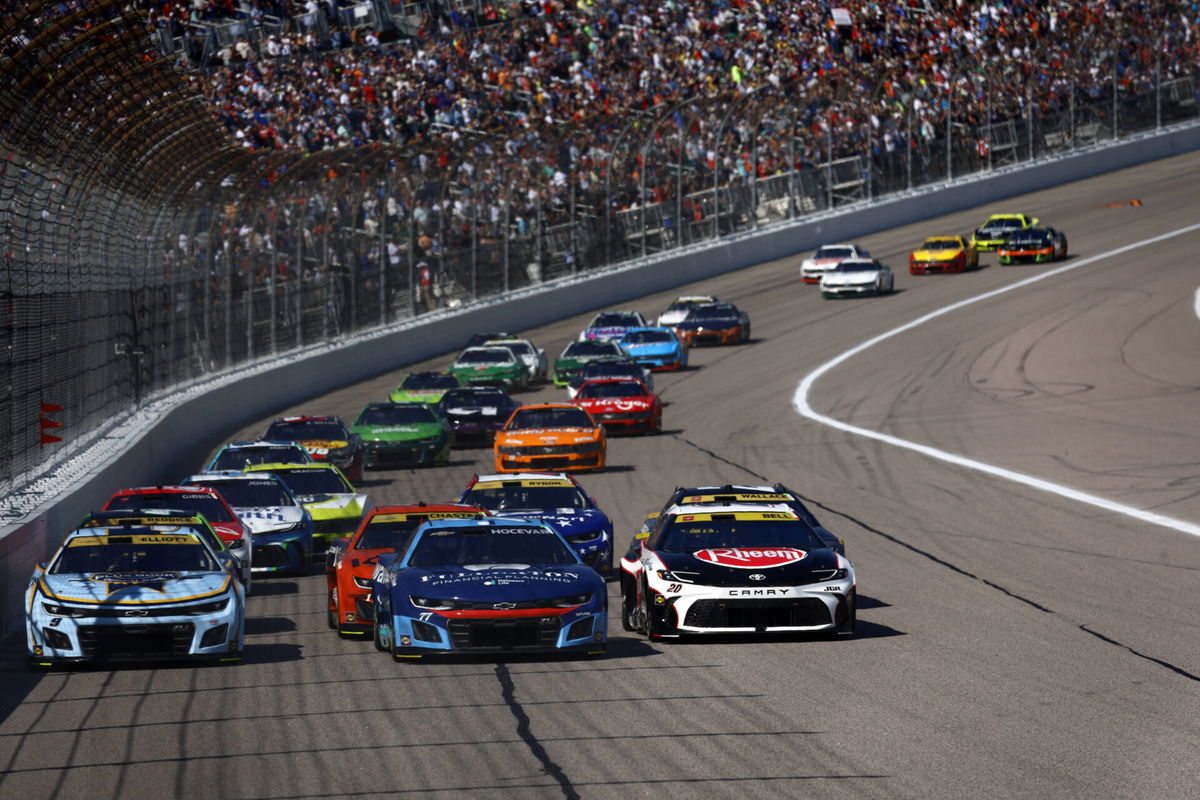Nov 6, 2025 | 8:41 PM EST

Imago
September 28, 2025, Kansas City, Ks, USA: CARSON HOCEVAR 77 of Portage, MI battles for position for the Hollywood Casino 400 Presented by ESPN BET in Kansas City, KS. Kansas City USA – ZUMAa161 20250928_aaa_a161_006 Copyright: xWalterxG.xArcexSr.x

Imago
September 28, 2025, Kansas City, Ks, USA: CARSON HOCEVAR 77 of Portage, MI battles for position for the Hollywood Casino 400 Presented by ESPN BET in Kansas City, KS. Kansas City USA – ZUMAa161 20250928_aaa_a161_006 Copyright: xWalterxG.xArcexSr.x

Imago
September 28, 2025, Kansas City, Ks, USA: CARSON HOCEVAR 77 of Portage, MI battles for position for the Hollywood Casino 400 Presented by ESPN BET in Kansas City, KS. Kansas City USA – ZUMAa161 20250928_aaa_a161_006 Copyright: xWalterxG.xArcexSr.x

Imago
September 28, 2025, Kansas City, Ks, USA: CARSON HOCEVAR 77 of Portage, MI battles for position for the Hollywood Casino 400 Presented by ESPN BET in Kansas City, KS. Kansas City USA – ZUMAa161 20250928_aaa_a161_006 Copyright: xWalterxG.xArcexSr.x
The NASCAR lawsuit has taken an unexpected twist. Just when the drama between 23XI, Front Row Motorsports, and the sanctioning body was heating up, it turns out that a new entity is entering the fray. Only this time, it’s Liberty Media Corporation, the owners of Formula 1, who were forced to scramble to protect their interests after the antitrust lawsuit threatened to reveal it all.
Watch What’s Trending Now!
Liberty Media has always protected Formula 1’s trade secrets from being exposed. But this time, there’s a real risk that the sensitive information could be exposed in public court records, a situation they were trying to avoid right from the get-go.
Liberty Media acts swiftly to protect sensitive data
In a rare crossover scenario, Liberty Media and Formula 1 motioned to have an attorney present in a Charlotte court to represent their interests. They even wrote, “Unsealing of the Wendling Declaration and related expert reports without redacting information regarding the Concorde Agreement would thus cause substantial competitive and commercial harm to Liberty Media and its affiliates.”
But why did they get involved in an antitrust lawsuit concerning the NASCAR world to begin with? Let’s rewind a bit. Earlier this year, Michael Jordan and Co. asked Liberty Media to share information they thought was relevant to the ongoing case, which the corporation obliged, albeit reluctantly. They gave a written statement called the Wendling Declaration.
That declaration provided confidential information about the Concord Agreement, Formula 1’s ‘top secret’ trade contract that governs how the sport’s money is ruled and managed. It’s fair to say that it contains some pretty sensitive financial and commercial information that is protected by confidentiality agreements.
Liberty Media and F1 have motioned to the Charlotte court a chance to have an attorney represent their interests where applicable to the NASCAR antitrust case.
Specifically, they want to protect the information provided under fact discovery from being unsealed and made public. pic.twitter.com/y3ZBWLIXW8
— Matt Weaver (@MattWeaverRA) November 6, 2025
But here’s where things take a turn. Recently, the judge ruled on summary judgment motions and then ordered that all the related filings be unsealed and made public after 48 hours. But Liberty Media wasn’t having it.
They’ve asked the court for permission to enter a “limited appearance”, just so that they can step into the case and protect its confidential information. The objective is to file a motion to seal (or redact parts of) the Wendling Declaration so that sensitive information doesn’t go public. So, while they’re not taking a side in the ongoing 23XI Racing and Front Row vs NASCAR case, they are asking the judge to come in briefly and file a motion to keep their details private.
Michael Jordan and Co. get a big win in ongoing NASCAR lawsuit
When 23XI and Front Row Motorsports lost their charters, many felt that the plaintiffs would be forced to concede defeat, especially after the financial strain from running in the ‘open’ category. However, Michael Jordan and the rest of his ‘rebellion’ maintained their stance, and they’ve managed to secure a big win in the process.
It all came down to the definition of a ‘marketplace’ in the ongoing lawsuit. According to NASCAR, the broader motorsports landscape, including Formula One and IndyCar, should be included. However, Judge Kenneth D. Bell claimed that the sanctioning body had already defined the term in its counterclaim last week, which was dismissed.
According to Bell, NASCAR’s countersuit was based on “the market for entry of cars into NASCAR Cup Series races in the United States and any other location where a Cup Series race is held.” And since the sanctioning body had already defined the term, Bell ruled NASCAR could not “play the same hand twice in different ways.”
“Most simply put, NASCAR made a strategic decision in asserting its counterclaim and must now live with the consequences,” Bell wrote. He added, “NASCAR wants to (but cannot) have it differently on each side of the same coin — heads we win, tails you lose.”
This ruling puts NASCAR in a spot, as they must now defend themselves in a jury trial scheduled to begin on December 1st. While the sports’ hierarchy has already issued a statement disagreeing with Bell’s ruling, they’ve also hinted at appealing to the U.S. Court of Appeals for the 4th Circuit, should they lose the trial later this year.



